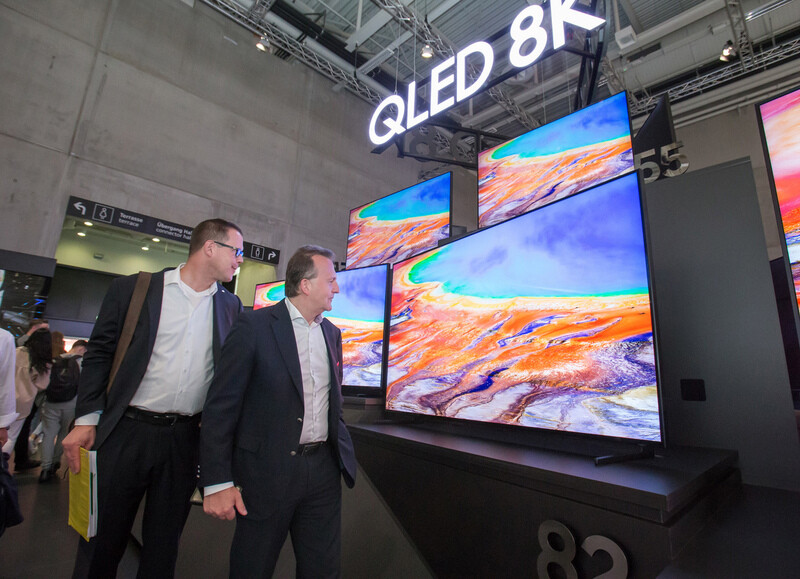hankyoreh
Links to other country sites 다른 나라 사이트 링크
Samsung and LG battle it out in the TV market

A conflict is heating up between Samsung Electronics and LG Electronics over television technology. The South Korea’s Fair Trade Commission (FTC) intends to approach their latest spat in terms of a “fair economy” — one of the key economic policies of the Moon administration — prompting curiosity about how this will all play out.
After LG reported Samsung’s QLED TV advertisement to the FTC on Sept. 20 for false advertising, Samsung launched a counteroffensive, including a press release on Sept. 22. Along with emphasizing that its QLED TV is the world’s top seller, Samsung openly disparaged LG’s OLED TV and predicted that “the market gap between the two” would “get even bigger over time.” The press release went a step further than a position statement on Sept. 20 in which Samsung said it would “respond firmly” to LG’s “groundless claims.”
The two countries have adopted quite different strategies for waging their “TV war.” LG emphasizes its technical differences with Samsung. According to LG, Samsung presents its QLED line of products as utilizing QLED, or in other words quantum-dot light-emitting diode technology, when they are actually structurally similar to LCD (liquid crystal display), in which a light-emitting diode, or LED, provides the backlight and a crystal display adjusts the intensity of that light. LG has also warned that these false and exaggerated advertisements could harm consumers and infringe their “right to know.” Meanwhile, Samsung has played up its advantage over LG in terms of sales figures and market share while simultaneously denigrating LG’s technical complaints as a “wasteful debate.” Some newspapers have waded into the debate in support of Samsung, expressing concerns that the two companies shouldn’t be fighting when Chinese companies are in hot pursuit.
The FTC, which has the authority to referee this debate, plans to view it through the lens of the “fair economy.” The agency believes that Samsung and LG became the world’s top two electronics manufacturers through their fierce competition with each other and regards their TV war as being part of that technological competition. “Our conclusion is that it’s beneficial in the medium and long term for industry’s technological advancement when companies keep tabs on and attempt to contain each other’s technology. That just motivates them to work even harder to develop technology with the goal of beating their rival,” said a senior official at the FTC.
There are two key criteria by which the FTC can judge whether Samsung’s commercial violated the Fair Labelling and Advertising Act. The first of these is an objective technical standard. “Since there are already universal standards and requirements for QLED TV in the academy and industry, a key question is whether Samsung TV meets those standards,” said a source at the FTC.
But even if Samsung’s product doesn’t line up completely with those standards and requirements, the FTC is unlikely to punish it for deceptive advertising as long as its televisions represent a groundbreaking technological advancement and can be distinguished from previous products. In 2015, Samsung began selling a premium lineup of TVs under the name SUHD TV that rendered colors better by adding a quantum dot film to the LCD that was already being used. In 2017, similar products reportedly went on sale with the name QLED TV.
The second criterion has to do with consumer misunderstanding, or in other words, whether an advertisement is liable to cause consumers to choose the wrong product. “In the case of products with high price tags such as TVs, we examine consumer misunderstanding by focusing on the target customers. Since TV consumers learn a lot about products, including their technological differences, through online searches and other methods before making a purchase, differences between the content of an advertisement and the key technology of the product it’s advertising are liable to mislead consumers,” the FTC said.
By Kwack Jung-soo, business correspondent
Please direct comments or questions to [english@hani.co.kr]

Editorial・opinion
![[Column] Has Korea, too, crossed the Rubicon on China? [Column] Has Korea, too, crossed the Rubicon on China?](https://flexible.img.hani.co.kr/flexible/normal/500/300/imgdb/original/2024/0419/9317135153409185.jpg) [Column] Has Korea, too, crossed the Rubicon on China?
[Column] Has Korea, too, crossed the Rubicon on China?![[Correspondent’s column] In Japan’s alliance with US, echoes of its past alliances with UK [Correspondent’s column] In Japan’s alliance with US, echoes of its past alliances with UK](https://flexible.img.hani.co.kr/flexible/normal/500/300/imgdb/original/2024/0419/2317135166563519.jpg) [Correspondent’s column] In Japan’s alliance with US, echoes of its past alliances with UK
[Correspondent’s column] In Japan’s alliance with US, echoes of its past alliances with UK- [Editorial] Does Yoon think the Korean public is wrong?
- [Editorial] As it bolsters its alliance with US, Japan must be accountable for past
- [Guest essay] Amending the Constitution is Yoon’s key to leaving office in public’s good graces
- [Editorial] 10 years on, lessons of Sewol tragedy must never be forgotten
- [Column] A death blow to Korea’s prosecutor politics
- [Correspondent’s column] The US and the end of Japanese pacifism
- [Guest essay] How Korea turned its trainee doctors into monsters
- [Guest essay] As someone who helped forge Seoul-Moscow ties, their status today troubles me
Most viewed articles
- 1[Column] The clock is ticking for Korea’s first lady
- 2After 2 months of delayed, denied medical care, Koreans worry worst may be yet to come
- 3Hong Se-hwa, voice for tolerance whose memoir of exile touched a chord, dies at 76
- 4[Column] Has Korea, too, crossed the Rubicon on China?
- 5US overtakes China as Korea’s top export market, prompting trade sanction jitters
- 6Samsung barricades office as unionized workers strike for better conditions
- 7[Editorial] As it bolsters its alliance with US, Japan must be accountable for past
- 8[Correspondent’s column] In Japan’s alliance with US, echoes of its past alliances with UK
- 9All eyes on Xiaomi after it pulls off EV that Apple couldn’t
- 10[Correspondent’s column] The US and the end of Japanese pacifism